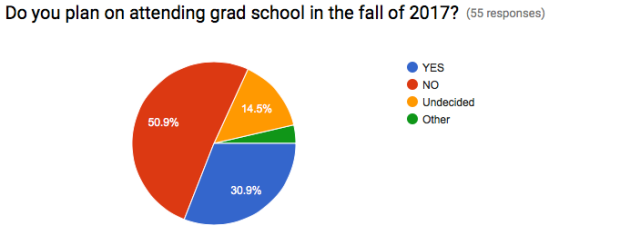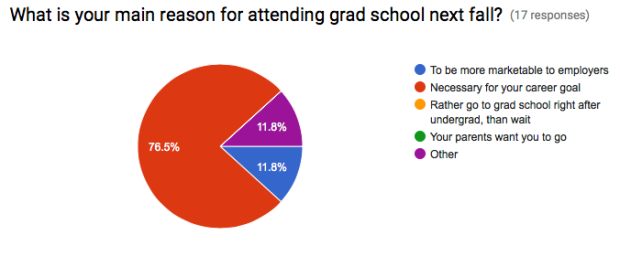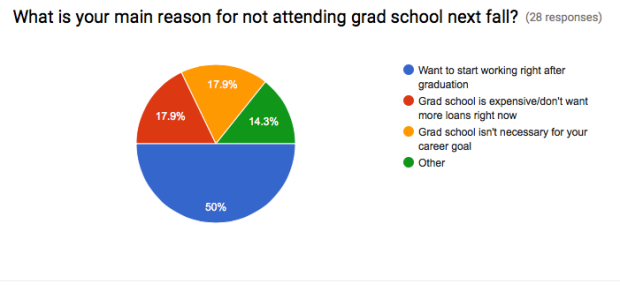Originally published in Issue 4, Fifty-First Year of The Minstrel (October 20, 2016). Click here to view the entire issue.
Grad school now or grad school later? The decision to go to grad school right after undergrad is mostly situational, not to mention stressful to think about. The Minstrel recently polled 55 seniors and 50.9 percent said they do not plan on attending grad school in the fall of 2017 with 50 percent saying they want to start working after graduation. Of the 30.9 percent that are attending grad school, 76.5 percent said grad school is necessary for their career goals.


 “You need to be going on to grad school for the right reasons. You don’t want to be going on to grad school if you’re trying to prolong going into the real world or if you’re uncertain with what you want to do with your life,” said Kristin Eicholtz, director of the career development center.
“You need to be going on to grad school for the right reasons. You don’t want to be going on to grad school if you’re trying to prolong going into the real world or if you’re uncertain with what you want to do with your life,” said Kristin Eicholtz, director of the career development center.
“Undergrad truly is the time to explore and figure out what it is that you’re most passionate about. And getting your master’s degree or that next level professional degree is taking that passion and bringing it to life.”
If someone is unsure about what they want to get a master’s in, Eicholtz advises it is best to work for a few years. Students may even be fortunate enough to get an employer that pays for the costs of a master’s degree for them. Only 14.8 percent of seniors surveyed were undecided about attending grad school in the fall and 50 percent of them said they were unsure of their career goal.
“If it’s something where you’re not 100 percent sure that’s exactly where your passion is and what you want to do long term, maybe work one or two years. Get a sense and feel further what your goals are and then apply to schools,”
said Eicholtz.
Additionally, a common concern students have is being removed from school and that once they are out of school, they won’t go back.
In order to avoid this sense of removal from school, students should make a timeline for themselves by setting goals of when they want to go to grad school. Those years of working after undergrad should be spent looking into graduate programs for when they do decide to make the decision to attend.
Having a master’s degree is not necessarily a competitive advantage if the career does not require it; however, 11.8 percent said their main reason to go to grad school is to be more marketable to employers. Some employers see a person who has a master’s degree as more expensive to employ.
Additionally, a master’s degree could be preferred, not required. In this scenario, someone with real-world experience after undergrad could have a leg-up on someone who went straight through grad school after undergrad.
Overall, the process of applying to grad school is similar to undergrad. Students should still tour the colleges, talk to people in the program, receive letters of recommendation and take standardized tests like the GRE, MCAT or LSAT; however, schools weigh these tests differently. Students also need to write a personal statement, similar to the undergrad college essay, where students explain their short-term and long-term goals.
The main difference between grad school and undergrad is grad school can be funded through grants, fellowships and graduate assistantships. There may be
a separate interview process for these, so it is extremely important to pay attention to deadlines.
Seniors applying to grad school should currently be done with standardized tests, on the second or third draft of their personal statements, have transcripts from the registrar and have asked their recommenders to write their letters. This allows November to be about final touches and be ready to send applications by after Thanksgiving and before Christmas.
“The career center works with students getting ready for grad school too,” said Eicholtz. “We review students’ personal statements and we go through a couple drafts with students until it gets to the point that they are happiest with it.”
The career development center has free resources on standardized testing as well. Their drop-in hours are Monday-Friday 10 a.m. to 3 p.m. and longer appointments can also be booked.

